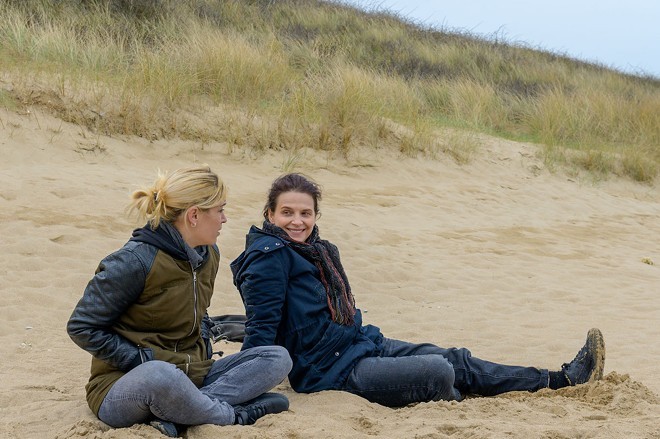
Cohen Media Group
When Marianne (Juliette Binoche) bonds with Chrystèle (Hélène Lambert), Chrystèle doesn’t know her new good friend is a journalist in search of info.
Between Two WorldsDirected by Emmanuel Carrère. Written by Emmanuel Carrère and Hélène Devynck, primarily based on a guide by Florence Aubenas. Opens in choose cities August 25.
Freshly divorced and successfully destitute, former homemaker Marianne (Juliette Binoche) arrives within the northwestern French coastal metropolis of Caen in search of a recent begin. She haunts employment places of work and job festivals, on the lookout for an employer who will take an opportunity on a middle-aged girl with a 23-year hole in her résumé. There’s just one choice for somebody in her place: part-time, minimum-wage work as a cleansing girl. She proceeds awkwardly by means of her government-assisted job coaching and a succession of depressing early postings, mopping flooring and scrubbing bathrooms within the wee hours for hostile, ungrateful shoppers. The roles change week to week, however her fellow cleaners appear to be drawn from a standard pool of hard-luck native ladies. Their ages and circumstances fluctuate, however all of those employees are broke, exhausted and unable to spare a lot time for his or her companions or youngsters.
Marianne presents her scenario as equally precarious, however it is a deception. She is, in truth, an investigative journalist, working undercover to shine daylight on the truth of France’s ongoing labor disaster, a late-capitalist cluster jam of poverty wages, grueling circumstances and continual underemployment. Hoping to develop her embedded experiences right into a guide, she absolutely commits to the bit, chopping off all contact together with her household, pals and colleagues in Paris and residing on her meager cleansing revenue. Nonetheless, there’s an intrinsic stress in her masquerade, fairly other than her anxiousness at being came upon: She engages on this drudgery by selection, and, not like her co-workers, she will be able to return to her bourgeois “actual” life at any time.
Between Two Worlds is loosely tailored by Emmanuel Carrère and Hélène Devynck from journalist Florence Aubenas’ prize-winning non-fiction guide Le Quai de Ouistreham. The movie is the third function directed by the multi-hyphenate Carrère, and the primary since his 2005 worldwide breakout The Moustache.
In comparison with that Kafka-esque psychodrama, Between Two Worlds is a comparatively simple, socially aware image, one which recollects the grim working-class portraiture of British filmmaker Ken Loach (I, Daniel Blake; Sorry We Missed You). Apart from Binoche, the performers in Carrère’s movie are all non-professionals, and so they acquit themselves fairly effectively reverse one in all France’s best residing actors. That is significantly the case with Hélène Lambert, who portrays Chrystèle, an intense and hard-bitten younger girl who naturally attracts Marianne’s eye. The 2 ultimately strike up a friendship, one which Marianne deludes herself into believing can survive her muckraking deception.
It is by means of Chrystèle that Marianne lands a gig cleansing the France-to-Britain ferry within the close by port of Ouistreham. It’s regular however brutal work, a marathon of vacuuming, scrubbing and sheet-changing that should be accomplished within the 90-minute window between arrival and departure. The cross-Channel ferry shall be a well-recognized setting for followers of Catherine Breillat’s glorious 2001 erotic noir Temporary Crossing. This provides a metatextual twist to the feeling that Between Two Worlds is peering backstage of contemporary French society, permitting hard-working, usually unrecognized laborers to face within the highlight, nonetheless briefly.
In fact, Ken Loach, for all his miserablism, is resolutely centered on poverty’s absurd cruelties and the flawed characters who muddle by means of such tribulations. In Between Two Worlds, the story’s investigative conceit makes Marianne the star of the story. Accordingly, the extra substantive day-to-day struggles of Chrystèle and the opposite employees finally really feel secondary to the journalist’s interior turmoil.
To Carrère’s credit score, this can be the purpose. The movie regards Marianne’s venture with ambivalence, critiquing her do-gooder self-importance and the broader drawback with treating “consciousness” as a commodity, one which requires inflicting deception and humiliation on the very individuals it goals to raise. Regardless, the preoccupation with Marianne’s conflicted conscience finally ends up taking on area that might in any other case be dedicated to the textured depiction of the grinding hardships (and fleeting joys) of Caen’s invisible janitorial employees.
Between Two Worlds by no means finds a strategy to satisfyingly resolve its disparate identities: a personality drama a couple of girl’s well-intentioned deception; a gritty, ground-level depiction of insecure wage slavery in modern France; and an equivocal exploration of the ethics and politics of covert journalism. The movie does ultimately choose Chrystèle’s livid, embarrassed sense of betrayal as its central emotional pillar as soon as Marianne’s lies start to unravel. Mathieu Lamboley’s pressing and haunting digital rating underlines the impression that Binoche’s journalist is hurtling in direction of a momentous check of her values and loyalties, one which received’t essentially solid her in a sympathetic mild.
Binoche is the sort of actor who appears to own her personal reality-warping gravitational area, and her prowess is discernible even when the fabric is flimsy. (Okay, perhaps not in Ghost within the Shell.) Between Two Worlds offers her a efficiency a couple of efficiency, a fittingly juicy position that’s additionally half a step faraway from the characters she usually portrays in French dramas. Marianne is a passive observer and chronicler, and he or she lacks the brittle, voluble edge that so typically characterizes Binoche’s Twenty first-century performances. But there’s a taut dramatic pleasure in watching Binoche and Lambert play off one another. Marianne sometimes says or does issues that subtly betray her professional-class background, and the sideways seems to be that Chrystèle offers her counsel that she senses one thing off about her new good friend. Their interactions give Carrère’s function the boundary-blurring psychological stress of an undercover spy or police drama. What’s actual right here, and the place does all of it finish? In tears, after all.





